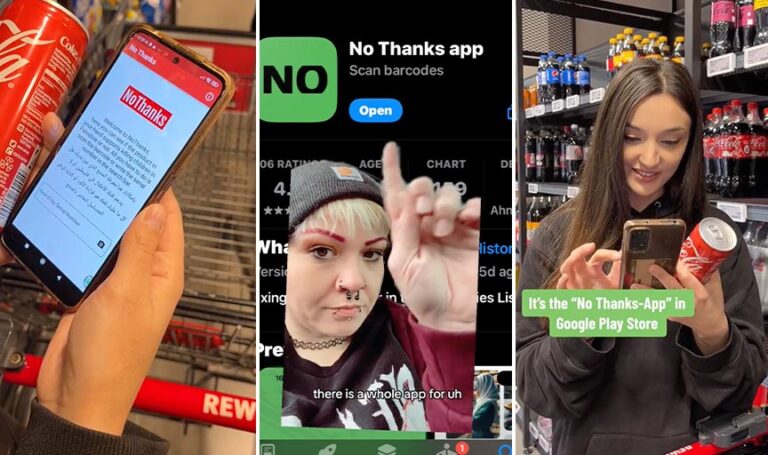What is the No Thanks app? And how are people using boycotting methods to protest the war in Gaza?

Boycott movements have existed for centuries now, in different countries, for different causes, and through different methods. Indeed, boycotting has become a powerful and necessary form of protest that has helped to enact legitimate change. Most recently, we’ve seen boycotting be implemented and utilised by people in opposition to the ongoing war in Gaza. More specifically, communities have begun using boycotting tactics to target the Israeli government and those supporting them.
The Boycott, Divestment and Sanctions (BDS) movement is a Palestinian-led collective who are committed to defending and advocating for the rights of Palestinians—particularly in response to Israeli persecution. The war in Gaza, which has claimed the lives of approximately 34,568 Palestinians and 1,139 Israelis, has shaken the entire global community.
Students across both the UK and the US have begun organising demonstrations and encampments to protest the war and to also call for their universities to divest from firms that supply arms to Israel and, in some cases, sever links with universities in Israel, as reported by The Guardian.
Another way people are expressing their anger and engaging in political protest is through boycotting apps. One of the most famous examples of this in past years has been Buycott, a platform and app that scans the barcode of a product and then suggests whether a consumer should buy or avoid it based on how well it aligns with the user’s values and principles.
For many of us, knowing and being aware of brands to avoid—or indeed to support—is a big element of our own civil resistance and responsibility. So, let’s delve into the newest pro-Palestine boycott app taking over the internet and the brands to keep an eye out for.
What is the No Thanks boycott app?
The No Thanks app is a very easy yet effective tool. Similarly to the Buycott app, all a user has to do is scan the barcode of a product and if the brand is on the boycott list then the user will be delivered a simple ‘No Thanks’ message. The purpose of the app is to deter people from purchasing products manufactured by companies that are either directly or indirectly supporting Israel.
@aljazeeraenglish As consumers supporting #Palestine continue to boycott western brands, Ahmed BashBash invented the NoThanks app to make this process easier. #israel #gaza #boycottisrael #news @NoThanks #ajstream
♬ original sound - Al Jazeera English
@handmodel_life #greenscreen #nothanks #boycott #resistence #🍉 #humanity
♬ original sound - HandModel_Life🍉🍉🍉
The No Thanks app was created by Ahmed Bashbash, a Palestinian currently living in Hungary. Speaking with DW News, Bashbash spoke about his motivations for creating the app: “I made it on behalf of my brother and my sister who I lost because of this brutal occupation, and my goal is to try to prevent what happened to me to happen to another Palestinian.”
When the No Thanks app was first launched it was quickly downloaded by over 100,000 people. However, shortly after it was released it was banned by Google for including the sentence: “You can see if the product in your hand supports killing children in Palestine.” This phrase was deemed by some as anti-Semitic. The app was then later reinstated.
Those promoting the No Thanks app have ensured that netizens keep up to date with the app’s progress and mission:
Important Update
— NoThanks (@NoThanksBoycott) May 1, 2024
We recently been the target of negative coverage from groups and individuals in the media with an anti-Palestinian agenda, they have been leaving comments with baseless claims such as the app being a virus/malware or stealing data. Our app clearly only requests… pic.twitter.com/wMf283zywp
Moreover, No Thanks has now facilitated nine aid and food distributions in Gaza:
More pictures for the food we made and distributed in the 9th distribution #NoThanksBoycott pic.twitter.com/aNcPO8evjq
— NoThanks (@NoThanksBoycott) April 26, 2024
Brands that support Palestine
So, what brands support Palestine? At one point, some people had assumed that cosmetics retailer Lush was one of the bigger companies to openly share its support for Palestine and the people of Gaza. In October 2023, shortly after the war began, the beauty brand faced backlash after one of its stores displayed a sign in the window stating “boycott Israel.”
However, it later arose that this was just the actions of one single employee, and the company subsequently condemned the sign.
Some clothing brands that support Palestine include 1309 Studios, PaliRoots, and Reemami.
Due to extensive capitalist ties, most mainstream food, clothing, beauty, and tech companies have made their way onto the boycott list. McDonald’s, Burger King, Puma, Barclays, and Disney have all been on the list for some time now.
During a time when people feel a serious lack of control and an overwhelming desire to try and enact change and impress upon governments the seriousness of public anger, boycotting can be an incredibly gratifying concept. The way in which people have taken to the BDS movement and its pursuit emphasises just how loud our voices can be.





